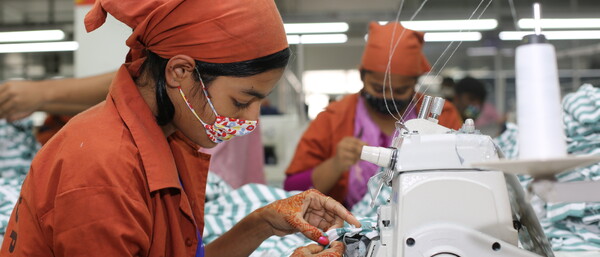
Our supply chain complaints report for 2024
Complaints from people in our supply chains are not a disruptive factor for us, but a valuable compass. They enable us to better understand and continuously improve working conditions along our global supply chains. Since 2023, large companies have been required by the German Supply Chain Duty of Care Act to have a complaints system. This allows everyone - whether employees from our business division, workers from our production facilities or other stakeholders - to report if something goes wrong somewhere.
At Tchibo, we recognised the importance of grievance systems even before the introduction of the Supply Chain Due Diligence Act and have been publishing insights into our experiences since 2021. For us, every piece of feedback is an opportunity: it helps us to better assess the state of human rights and environmental protection in our supply chains, identify violations of labour and environmental standards and take remedial action together with those affected and those responsible. In addition, we can derive many insights from the complaint cases that help us to adapt our ongoing supply chain programmes even better to the needs of the workers in our production facilities, for example.
The figures for 2024 at a glance
In 2024, we received a total of 81 reports. All originated from production facilities in Bangladesh and were recorded via various channels.
Focal points of the reports:
o Wages and severance payments (64 cases)
o Discrimination and unequal treatment (16 cases)
o Restriction of freedom of assembly (1 case)
Most important reporting channels:
o International Accord industry initiative and the associated RMG Sustainability Council RSC (66 cases)
o Initiative ACT (Action, Collaboration, Transformation) (2 cases)
o Trade unions (13 cases)
Findings and fields of action
The figures clearly show that trust is the key.
· Trust through cooperation: The high number of reports via channels involving trade unions and independent initiatives confirms their credibility and reach. They are a safe point of contact for workers.
· Transparency creates impact: We and the initiatives have a high level of transparency at the production site level. Thanks to our local colleagues, who work closely with producers and local partner organisations, we can respond quickly and effectively to reported problems at this stage of the supply chain.
· Potential deep in the chain: We see the fact that we did not receive any complaints from lower stages of the supply chain (e.g. yarn production, raw material cultivation) in 2024 as a clear mandate: we need to further increase the awareness and accessibility of our complaints channels in this area.
Our next steps: Listen and act
Our experience shows us that those who are open to criticism remain capable of learning and become more effective. That is why we are systematically expanding our complaints system.
· Strengthening dialogue: We are specifically intensifying our cooperation with trade unions. We also use our human rights dialogue approach "WE Programme" to not only resolve individual cases together with suppliers and producers, but also to identify fundamental systemic grievances and address them with long-term measures.
· Expand local measures:
o In Bangladesh, we are campaigning for the existing industry-wide complaints mechanism on health and safety to be extended to other areas.
o In Pakistan, we are working with (local) partners to develop easily accessible, factory-internal complaints channels, which are already proving successful in the first pilot plants.
o In Turkey, we are strengthening the internal reporting offices of our producers through the WE programme.
Our goal is clear: to achieve sustainable improvements for all people in our supply chains through an open and trustworthy complaints system and to stand up together for fair working conditions.
If you would like to learn more about our complaints system, you can find more information here.
